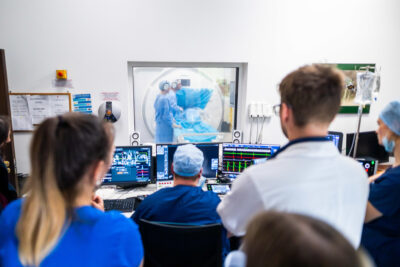The board adopted the 2025 budget concept of Semmelweis University. In the area of publicly funded education, the institution expects a 3 percent valorization; in the area of operations, it calculates with consolidated market energy prices and the compensation subsidy of the Directorate-General for Public Procurement and Supply (KEF) for operations; in the area of health, it expects a 6 percent increase in inpatient care compared to this year, and in outpatient care, it expects performance to equal 2024. State aid for education and foreign-currency training revenues are also expected to increase. The concept also includes the principles for planning personnel and material costs for the coming year and the principles for internal allocation of revenues and expenses were also adopted. Major investments already underway (Városmajor 70; National Training Center for Medical Innovation/NOIKK; Faculty of Health and Public Administration’s campus on Ferenc square; Department of Public Dental Health/FSZOI; Anatomy I-II) will proceed, and several major planned developments may also start (the procurement procedures for the construction of EOK2, Hőgyes-Schöpf-Merei Pharmaceutical Research Center/HSM, and the Department of Dermatology). The preliminary revenue plan foresees HUF 286 billion in 2025, compared to HUF 271 billion in 2024. Current expenditure, excluding investment expenditure, is projected at HUF 277 billion next year, compared to HUF 265 billion this year. The revenues of the current year, in addition to financing current expenses, also partly serve as a source of investment funds. The university also has funds for investment from the Foundation for National Health Care and Medical Education (NEOA) and from the public funding contract for development funds, said Chancellor Dr. Lívia Pavlik. In accordance with the principles of the adopted budget concept, the 2025 budget plan will be presented at the Senate meeting on December 16, 2024.
The Organizational and Operational Rules (SzMSz) were amended. The provisions on the publicity and disclosure of certain regulatory documents of the university were changed by implementing the internal regulations of the institution in the legal database. The special rules of the Study and Examination Regulations for internships and practical training at the András Pető Faculty (PAK) were amended. Accordingly, the aggregate marks of the internship reports can only be assessed if all marks are assessable, i.e. there is no “fail”. Also concerning PAK, the Admission Rules on foreign language training were amended, due to the launch of an English-language training program.
The board decided to introduce the elective subject “Voluntary work in flood management”. This will allow students engaged in flood protection to receive one credit point.
The proposal was adopted to clarify the foreign language requirements for undivided courses. In accordance with the Act on National Higher Education, students who have passed the final examination are eligible for a diploma without any further conditions – university regulations on undivided training will be changed accordingly. The requirement for the intermediate state language examination for the award of the diploma will be abolished for students who have already passed the final examination in this degree program or who will pass the final examination in the academic year 2024/25. All other students are required to pass the final general language exam in English and the basic university language exam for specific purposes. For students of the Faculty of Pharmaceutical Sciences who started their studies before the academic year 2023, the language examination requirement is not limited to the English language, so they are required to pass a basic university examination in English as well as a final general language examination in English/German/French/Spanish/Russian/Italian, which can be replaced by a state-recognized intermediate language exam.
The composition of the Equal Opportunities Committee was changed, as one of the committee members graduated from the university.
Senators decided to launch a new master’s degree program in midwifery. The Faculty of Health Sciences has been offering a BSc-level midwifery program since 2006, but there has been no opportunity for further training and professional development of graduates, making it necessary to launch an MSc-level program. By the end of the four-semester, 120-credit program students will become qualified midwives. The course was established in cooperation with the University of Győr.
Decisions were made on this year’s Innovation Awards recipients. The senators also reviewed a current application for a senior management post.
Ádám Szabó
Translation: Judit Szabados-Dőtsch
Photo (illustration) by Attila Kovács – Semmelweis University


